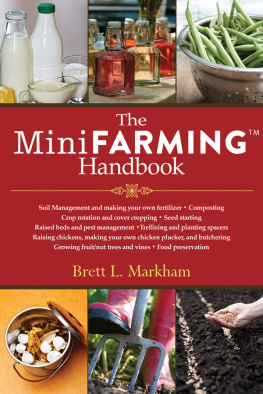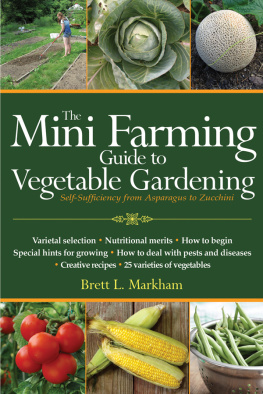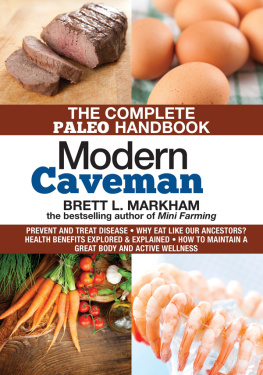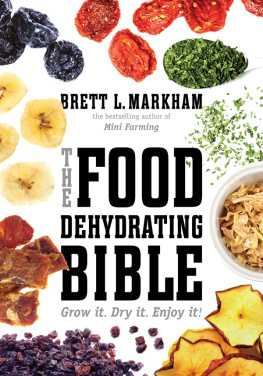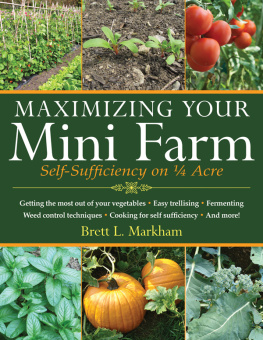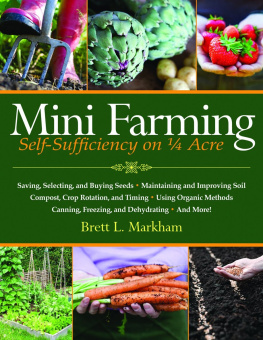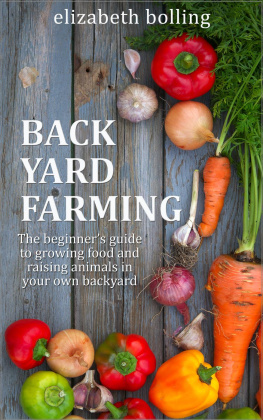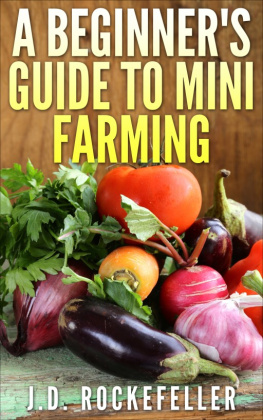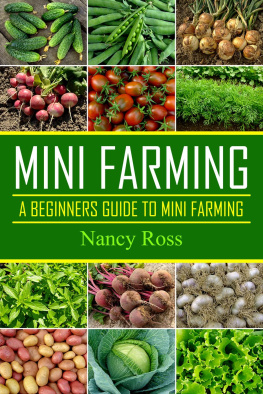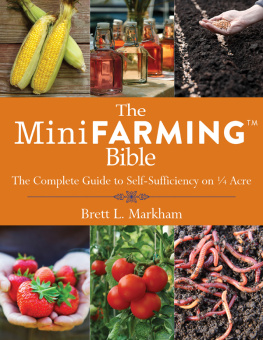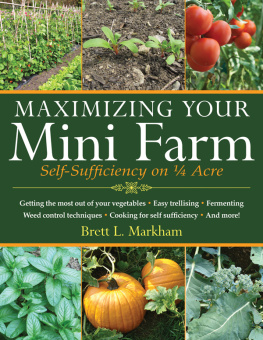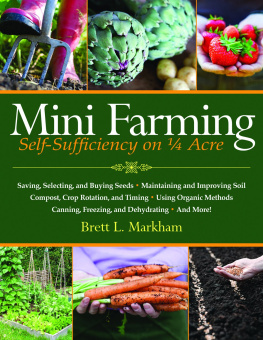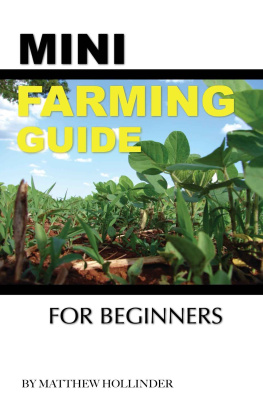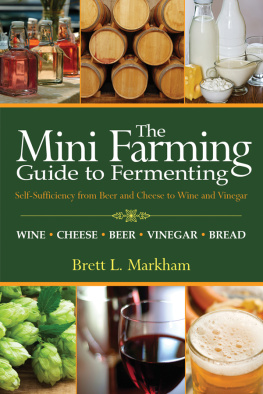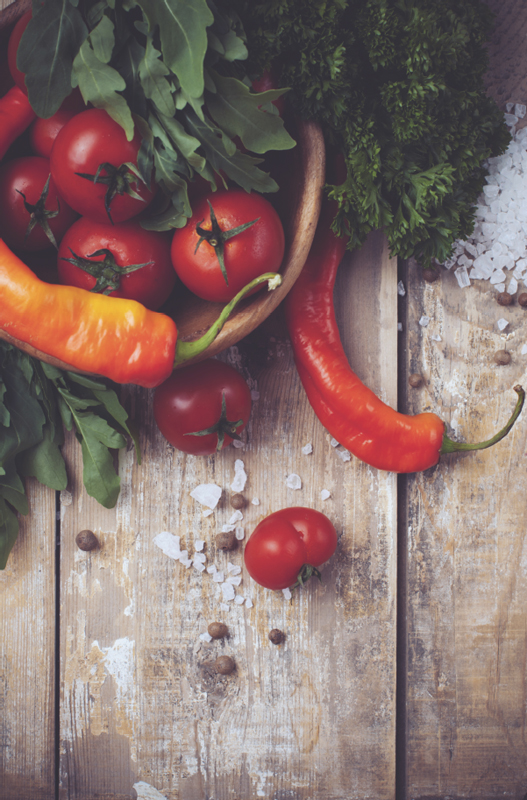
Copyright 2014 Brett L. Markham
Sections of this book were previously published in Mini Farming, Maximizing Your Mini Farm, The Mini Farming Guide to Fermenting , and The Mini Farming Guide to Composting .
All Rights Reserved. No part of this book may be reproduced in any manner without the express written consent of the publisher, except in the case of brief excerpts in critical reviews or articles. All inquiries should be addressed to Skyhorse Publishing, 307 West 36th Street, 11th Floor, New York, NY 10018.
Skyhorse Publishing books may be purchased in bulk at special discounts for sales promotion, corporate gifts, fund-raising, or educational purposes. Special editions can also be created to specifications. For details, contact the Special Sales Department, Skyhorse Publishing, 307 West 36th Street, 11th Floor, New York, NY 10018 or .
Skyhorse and Skyhorse Publishing are registered trademarks of Skyhorse Publishing, Inc., a Delaware corporation.
Visit our website at www.skyhorsepublishing.com.
10 9 8 7 6 5 4 3 2 1
Library of Congress Cataloging-in-Publication Data is available on file.
ISBN: 978-1-62914-197-8
eISBN: 978-1-62914-287-6
Printed in China
Introduction
One of the most common questions Ive been asked is What is Mini Farming, and how does it differ from gardening? The simple answer is that Mini Farming is a lot like gardening, except that it is seen from the perspective of economics in terms of money and time. Like all simple answers, it doesnt tell the whole story, and many essentials are missing. To fill in the blanks requires an understanding of the origin of the idea and the needs it sought to meet.
I am not sure how things are going in other parts of the world, but in the United States anyway, people are getting squeezed economically. In 2007, before the most recent recession, the Economic Policy Institute reported that, with the exception of a brief period in the late 1990s, real wages for median and low-wage workers had remained stagnant from 1973 to 2007 despite impressive gains in productivity.
Meanwhile, as I was formulating the conceptions of Mini Farming in 2005 and 2006, I had noticed a substantial rise in the number of home foreclosures. In fact, from 2000 to 2006, the foreclosure rate had more than doubled. I saw this as very troubling given that the period from 2001 to 2006 was widely reported as an economic recovery, rather than a recession. Ultimately, there were 470,000 foreclosures in 2000, but a staggering 2.3 million annual foreclosures by 2012.
Also, during that time, I observed that the price of gas and home heating oil had tripled between 2000 and 2006. Its even higher now. But even without that factor, oil prices indirectly affect the price of nearly everything else in our economy and directly affect most budgets for commuting and heating.
So the first need I sought to address with Mini Farming is a distinctly economic one. Even though big picture issues such as oil prices, foreclosure rates and wage stagnation over a period of decades are adversely affecting millions of people, those matters are well beyond my ability to fix. But for any given household, the effect of those factors can be reduced dramatically by growing your own food in an economically sensible way. In other words, instead of worrying about things I cant change, I instead focused on things that I can change, such as helping people grow their own food.
Gardening is a hobby because the way most people go about it, by the time you account for the costs of transplants, seeds, fertilizer and pesticides, it only manages to break even economically. The value of the food grown approximates the cost of the inputs. Alternatively, Mini Farming methods create food with greater value than the cost of elements that go into it. The net economic positive in offsetting food bills has the same economic effect on the family as a very large tax-free raise.
This also has the effect of turning the home from a very high priced hotel into an income producing asset. The typical suburban home is mainly a place where people sleep and watch television. Though it may appreciate over time, the cold hard reality is that as of this writing, more than seven million home owners actually owe more on their home than it is worth. Mini Farming looks at the yard around your home as a source of valuable products. Your home is transformed from a place of consumption into a center of production that pays you every week. This transformation makes a home substantially more affordable because the food it produces to offset grocery bills can be worth enough to pay the mortgage.
Even for people who can regularly afford fruits and vegetables, the depletion of trace nutrients in agricultural lands over the decades has led to a steady decline in the nutritional content of the vegetables we buy. Commodity agriculture does not reward production of nutritionally superior products because it draws no distinctions based on nutritional value. Because of this, fertilizer regimens are focused only on minerals necessary to make a product that looks good. Of the 50 or more minerals humans need in their diet, only 13 are regularly replenished in commodity agriculture. As a result, though the specifics vary with the crop, the content of elements such as copper in our foods has dropped by as much as 96% since the 1930s.
Mini Farming methods use organic amendments rich in trace minerals as well as composting and biochar to retain those minerals. Of course, food raised at home is more fresh than food from the supermarket, which results in a higher vitamin content as well. On the scale of a Mini Farm, sustainable organic methods not only produce the most nutritious food, but they are the most economically productive as well. Mini Farming combines intensive agricultural methods with organic sustainable methods and up-to-date soil and pest management practices to give you amazing production of nutritious and delicious food at a net profit.
So the major objectives of Mini Farming pertain to economics and nutrition, and those objectives are achieved through sustainable and intensive methods.
Of course, in the modern world, people are pressed for time. Commuting times are longer, work hours are longer and many times our employers expect us to be glued to smart phones even while we sleep. A harried parent who is struggling to pick up children from daycare after work doesnt have eight hours a day to dedicate to food production. So Mini Farming methods are optimized for time. As a result, the time investment amounts to about an hour a day when averaged over a year, in exchange for netting 80% of the food needed for a family of four.
Mini Farming also has some minor goals. The social realities of the American family are causing key self-sufficiency skills to be lost. According to CDC statistics, more than 40% of children are born to unmarried mothers. Of those born to married couples, 50% of the children will see their parents divorce. This means that in aggregate, 70% of children born are winding up in homes missing a parent. These circumstances necessitate schedules and lifestyles that are usually incompatible with parents passing on skills they learned from their own parents. Those skills might include sewing, fishing, cooking, gardening, canning, cheese-making, wine-making, pruning apple trees and more. The opportunity to pass along these skills simply doesnt exist, and so over the past few generations they have become increasingly rare.

